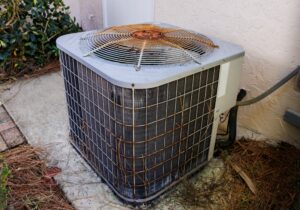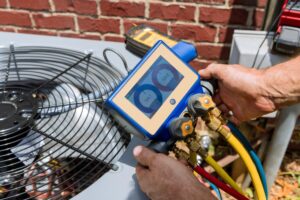By heating water and distributing it through radiators or underfloor systems, boilers keep your home cozy and comfortable. However, the very nature of how boilers operate — by constantly handling water — leaves them vulnerable to rust and corrosion. Fortunately, the experts at H.J. Faust are here to help you prevent these issues and keep your boiler running efficiently for years to come.
Why Rust Isn’t Too Common on Residential Boiler Systems
You might think that rust would be a regular issue for boilers since they deal with water, but modern residential boilers are designed to resist corrosion. Many are constructed from materials like stainless steel or cast iron, which are inherently more resistant to rust. Additionally, closed-loop systems — where the same water circulates through the system — minimize exposure to oxygen, a primary culprit of rust.
Of course, just because rust isn’t common with residential boilers that doesn’t mean it can’t occur. Taking preventive steps is essential to avoid costly repairs or replacements of your boiler system and its individual components.
Why Any Signs of Boiler Corrosion Is a Concern
If you notice rust or corrosion on your boiler system, it’s time to take action. Corrosion can weaken your boiler’s components, leading to leaks, inefficiencies, or even complete system failure. These issues not only disrupt your home’s heating but can also result in higher energy bills and expensive repairs. Here’s a closer look at why you should address potential sources of boiler corrosion as soon as possible:
- Reduced Efficiency: Corrosion can create blockages in the system, preventing water from flowing freely and reducing the boiler’s ability to heat effectively.
- Safety Concerns: In severe cases, corrosion can compromise the structural integrity of the boiler, increasing the risk of dangerous malfunctions or leaks.
- Shortened Lifespan: Rust and corrosion can accelerate wear and tear, reducing the overall lifespan of your boiler system.
- Costly Repairs or Replacement: The longer corrosion goes untreated, the more likely it is to cause significant damage that requires extensive repairs or even a full boiler replacement.
Is your boiler system corroded? It’s crucial to contact a professional technician from H.J. Faust immediately to address the issue before it worsens.
Types of Corrosion Found in Home Boilers
Be on the lookout for these types of corrosion on your home’s boiler system:
- Caustic Corrosion: This occurs when the boiler’s water pH is too high, causing metal surfaces to rust. Eventually, affected boiler components will weaken and fail altogether.
- Acidic Corrosion: Acidic corrosion happens when the water’s pH level drops too low, resulting in an acidic environment that eats away at the metal. This type of chemical reaction is often caused by improper water treatment, contamination, or acid cleaning.
- Pitting Corrosion: Pitting happens when small areas of metal are exposed to corrosive agents, creating localized holes or pits. This type of corrosion is particularly dangerous because it can lead to leaks and structural failures.
- Crevice Corrosion: This type develops in tight spaces, such as joints or seams, where water and oxygen can become trapped. It’s often exacerbated by debris or mineral buildup.
Tips for Preventing Boiler Corrosion
Because things rust when water comes into contact with a metal surface in the presence of dissolved oxygen or carbon dioxide, boilers were designed to minimize these ideal conditions for corrosion. Of course, if the unit isn’t properly maintained, issues can arise that make the entire system vulnerable to rust. Therefore, preventing rust and corrosion in your boiler system starts with proactive maintenance and care. Follow these tips to ensure your boiler remains in excellent condition:
Schedule Regular Maintenance
Routine inspections by a professional technician are essential for spotting early signs of corrosion and addressing them before they escalate. H.J. Faust offers comprehensive residential boiler services to keep your system running smoothly.
Use Corrosion Inhibitors
These chemicals are designed to prevent boiler corrosion by neutralizing oxygen and other corrosive substances in the water. Make sure your system has the appropriate inhibitors and invest in chemical treatment as needed.
Check for Leaks
Even small leaks can introduce oxygen into the system, increasing the risk of rust. Inspect your boiler tubes, pipework, and radiators regularly for signs of leaks and have them repaired promptly.
Maintain Proper Water Chemistry
The water in your boiler system should be at the correct pH level to prevent corrosion. A professional technician can test the boiler water pH and make adjustments if needed to ensure the optimal chemical balance.
Flush the System Periodically
Over time, debris and mineral buildup can contribute to corrosion. Flushing the system removes these contaminants, helps maintain its efficiency, and prevents complete boiler failure.
Install a Magnetic Filter
Magnetic filters capture rust particles and other debris before they can circulate through the system, providing an additional layer of protection against corrosion.
Replace Aging Components
Older parts are more susceptible to rust and corrosion. If your boiler is more than 15 years old or showing signs of wear, it may be time to consider upgrading to a newer, more efficient model.
Get Your Boiler System Professionally Inspected to Prevent Rust and Corrosion
While there are steps you can take on your own to prevent boiler corrosion, professional maintenance is key to ensuring your system operates efficiently and safely. At H.J. Faust, we provide high-quality residential heating services in Burlington, WI, and our technicians are highly trained to deliver lasting results.
When you schedule a boiler inspection or maintenance service with H.J. Faust, we’ll:
- Thoroughly inspect your system for signs of rust, leaks, or other issues.
- Flush the system to remove debris and contaminants.
- Replace or repair any components showing signs of wear or damage.
If you need help preventing your boiler from rusting, contact our expert technicians today. We’ll respond quickly to keep your system in peak condition all season long.



